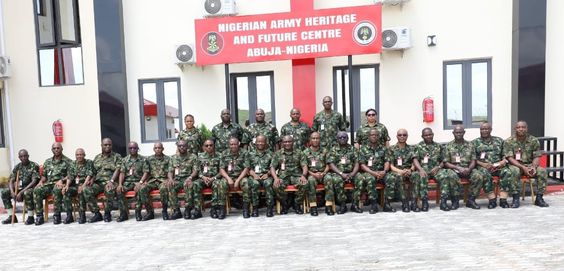Security & Crime
For modernization, the Nigerian Army must adopt contemporary technology -Gen. Umar

Brig.-Gen. Aminu Umar, the Deputy Commandant and Director of Studies at the Army War College Nigeria (AWCN), has emphasised the importance of the Nigerian Army embracing new technology to accomplish modernization.
On Thursday in Abuja, Umar made this statement while presenting a paper titled “Future Warfare and Modernization of the Military: Implications for the Nigerian Army by 2033.”
He asserts that the Nigerian Army must make intentional efforts to equip its men with the abilities needed to use cutting-edge technologies.
The strength of the Nigerian army, according to the available records, was approximately 180,000 people as of the second quarter of 2023, he claimed.
According to the records, 6,840 employees, or 4.28 percent, received training in emerging technologies.
“The remaining 153,160 employees, or 95.72 percent of the workforce, had little knowledge of developing technologies, which would limit the army’s ability to use the technology for modernization.
For instance, the Nigerian Army’s efforts to modernise the army are hampered by a lack of trained personnel in emerging technology.
The army must therefore make a concerted effort to provide people with the abilities needed to use developing technologies.
The creation of a competent labour force is therefore essential for modernization by 2033, he said.
Umar asserted that while war’s fundamental nature endures, its character shifts. He added that technology, which has transformed everything from tactics and logistics to armament and autonomous systems, was one of the main forces behind the transformation.
Future warfare, according to him, would likely be characterised by significant structural and industrial damage, force dispersion, smaller, more tailored force structures, new personal equipment, data links to the individual soldier, a 360-degree threat, and an enemy force structure that was non-traditional, among other things.
He claims that the Nigerian army, which is a vital component of the country’s armed forces, has added a variety of military items to its inventory with cutting-edge technology applications as part of modernization efforts to increase operational efficiency.
For instance, in 2020, the Nigerian army and the National Information Technology Development Agency (NITDA) collaborated to create the Land Forces Simulation Centre (LFSC).
“The Centre was established in 2021 and has continually been used to strengthen army personnel’s capabilities to increase operational effectiveness.
In order to develop and keep up a UAV force that will be quick to respond and prompt in delivering air imagery intelligence for Nigerian army tasks, the army also established the UAV Command in 2020, according to him.
He claims that despite these initiatives, the army has not completely tapped into the potential of utilising emerging technologies to modernise it and increase both its present and its future operational efficacy.
This has hindered the ability of the Nigerian army to use precision-guided offensive and defensive weapons technologies, and could be due to a lack of competent manpower and technological infrastructure, among other things.
The threat of terrorism and other new security challenges in Nigeria must be combated through sensors, early warning systems, surveillance, and improved communications, he continued.
According to Umar, the Nigerian army is now engaged in a variety of combat operations. He also said that there are various opportunities for modernization through the use of emerging technology that can improve the effectiveness of such operations.
He lists them as being robotics, blockchain technology, virtual and augmented reality, AI, and so on.
Maj.-Gen. Obinna Ajunwa, the director general of the Nigerian Army Heritage and Future Centre, expressed his gratitude for the resource’s and the discussion’s participants’ thought-provoking talk.
The lecture, according to Ajunwa, was one of many that the centre planned to hold so that it would have access to enough information to produce a strong paper for the Army Headquarters. (NAN)
